Speaker of the Lok Sabha
The speaker of the Lok Sabha (IAST: Lok Sabhā Adhyakṣa) is the presiding officer and the highest authority of the Lok Sabha, the lower house of the Parliament of India.[2] The speaker is elected generally in the first meeting of the Lok Sabha following general elections. Serving for a term of five years, the speaker is chosen from sitting members of the Lok Sabha.
| Speaker of the Lok Sabha | |
|---|---|
| Lok Sabhā Adhyakṣa | |
 Emblem of the Lok Sabha | |
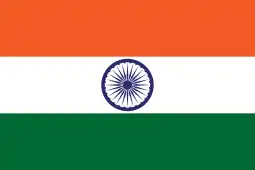 | |
| Lok Sabha | |
| Style |
|
| Status | Presiding member of the Lok Sabha |
| Member of | Lok Sabha |
| Reports to | Parliament of India |
| Residence | 20, Akbar Road, New Delhi, Delhi, India[1] |
| Seat | 16, Parliament House, Sansad Marg, New Delhi, Delhi, India |
| Appointer | Members of Parliament (Lok Sabha) |
| Term length | During the life of the Lok Sabha (five years maximum) |
| Constituting instrument | Article 93 of the Constitution of India |
| Precursor | President of the Constituent Assembly of India |
| Inaugural holder | Ganesh Vasudev Mavalankar (1952–1956) |
| Formation | 15 May 1952 |
| Deputy | Deputy Speaker of the Lok Sabha |
| Salary | • ₹450,000 (US$5,600) (per month) • ₹5,400,000 (US$68,000) (annually) |
| Website | speakerloksabha |
| This article is part of a series on the |
 |
|---|
|
|
Election of the speaker
Newly elected Members of Parliament from the Lok Sabha elect the Speaker among themselves. The Speaker should be someone who understands how the Lok Sabha functions and he/she should be someone accepted among the ruling and opposition parties.
MPs propose a name for the Pro tem speaker. These names are notified to the President of India. The President through their aide Secretary-General notifies the election date. If only one name is proposed, the Speaker is elected without any formal vote. However, if more than one nomination is received, a division (vote) is called. MPs vote for their candidate on such a date notified by President. The successful candidate is elected as Speaker of the Lok Sabha until the next general election. Till now, all elections of Lok Sabha speakers have been unanimous.[3][4]
Powers and functions of the speaker
The Speaker of the Lok Sabha conducts the business in house, and decides whether a bill is a money bill or not. They maintain discipline and decorum in the house and can punish a member for unruly behaviour with respect to law after suspending them. They also permit the moving of various kinds of motions and resolutions such as a motion of no confidence, motion of adjournment, motion of censure and calling attention notice as per the rules. The Speaker decides on the agenda to be taken up for discussion during the meeting. The date of election of the Speaker is fixed by the President. Further, all comments and speeches made by members of the House are addressed to the Speaker. The Speaker also presides over the joint sitting of both houses of the Parliament of India. The counterpart of the Speaker in the Rajya Sabha (Council of the States) is its Chairperson; the Vice-President of India is the ex-officio chairperson of the Rajya Sabha. On the order of precedence, the Speaker of Lok Sabha ranks sixth, along with the Chief Justice of India. The Speaker is answerable to the House. Both the Speaker and Deputy Speaker may be removed by a resolution passed by the majority of the members. Lok Sabha Speaker can be elected by President on a nomination basis.
All bills passed requires the speaker's signature to go to the Rajya Sabha for its consideration. The Speaker also has a casting vote in the event of a tie. It is customary for the Presiding Officer to exercise the casting vote in such a manner as to maintain the status quo.
Removal of the speaker
Speaker can be removed by the Lok Sabha by a resolution passed by effective majority of the house as per Constitution of India[Articles 94].
The Speaker is also removed on being disqualified for being Lok Sabha member under sections 7 and 8 of Representation of the People Act, 1951.[5] This would arise out of speaker's wrong certification of a bill as money bill inconsistent with the definition given in Articles 110 of the constitution.[6] When courts uphold the unconstitutional act of the speaker for wrong certification of a bill as money bill, it amounts to disrespecting the constitution deserving conviction under Prevention of Insults to National Honour Act, 1971 which is applicable for disqualification of speaker's Lok Sabha membership under section 8K of Representation of the People Act, 1951. However, the omissions in the procedure committed by the speaker in the Lok Sabha can not be challenged in court of law per Article 122.[7]
Pro tem speaker
After a general election and formation of a new government, a list of senior Lok Sabha members prepared by the Legislative Section is submitted to the Minister of Parliamentary Affairs, who selects a pro tem speaker. The appointment has to be approved by the President.[8]
The first meeting after the election when the Speaker and the Deputy Speaker are selected by members of the Parliament is held under the pro tem Speaker. In absence of the Speaker, the Deputy Speaker acts as Speaker and in the absence of both a committee of six members selected by the Speaker will act as Speaker according to their seniority.
Eligiblilty for Speaker of the Lok Sabha include:
- Being a citizen of India;
- Not be less than 25 years of age;
- Not holding any office of profit under the Government of India, or a state government; and
- Not being a Criminal Offender.
List of speakers
| No.[lower-alpha 1] | Portrait | Name | Constituency | Tenure[9] | Lok Sabha (election) |
Party | |||
|---|---|---|---|---|---|---|---|---|---|
| 1 | 
| Ganesh Vasudev Mavalankar (1888-1956) | Ahmedabad | 15 May 1952 | 27 February 1956 | 3 years, 288 days | 1st | Indian National Congress | |
| 2 | M. A. Ayyangar (1891-1978) | Chittoor | 8 March 1956 | 4 April 1957 | 6 years, 39 days | ||||
| 5 April 1957 | 31 March 1962 | 2nd | |||||||
| 3 | Hukam Singh (1895-1983) | Patiala | 17 April 1962 | 16 March 1967 | 4 years, 333 days | 3rd | |||
| 4 | 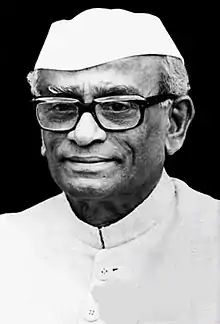 |
Neelam Sanjiva Reddy (1913-1996) |
Hindupur | 17 March 1967 | 19 July 1969 | 2 years, 124 days | 4th | ||
| 5 | Gurdial Singh Dhillon (1915-1992) | Tarn Taran | 8 August 1969 | 17 March 1971 | 6 years, 111 days | ||||
| 22 March 1971 | 1 December 1975 | 5th | |||||||
| 6 | .png.webp) |
Bali Ram Bhagat (1922-2011) |
Arrah | 15 January 1976 | 25 March 1977 | 1 year, 69 days | |||
| (4) | 
| Neelam Sanjiva Reddy (1913-1996) | Nandyal | 26 March 1977 | 13 July 1977 | 109 days | 6th | Janata Party | |
| 7 | 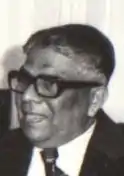
| K. S. Hegde (1909-1990) | Bangalore South | 21 July 1977 | 21 January 1980 | 2 years, 184 days | |||
| 8 | 
| Balram Jakhar (1923-2016) | Ferozpur | 22 January 1980 | 15 January 1985 | 9 years, 330 days | 7th | Indian National Congress | |
| Sikar | 16 January 1985 | 18 December 1989 | 8th | ||||||
| 9 | 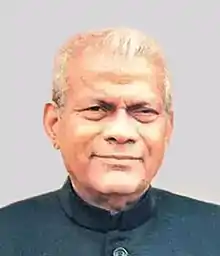
| Rabi Ray (1926-2017) | Kendrapara | 19 December 1989 | 9 July 1991 | 1 year, 202 days | 9th | Janata Dal | |
| 10 | 
| Shivraj Patil (1935-) | Latur | 10 July 1991 | 22 May 1996 | 4 years, 317 days | 10th | Indian National Congress | |
| 11 | .png.webp)
| P. A. Sangma (1947-2016) | Tura | 23 May 1996 | 23 March 1998 | 1 year, 304 days | 11th | ||
| 12 | 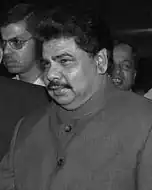
| G. M. C. Balayogi (1951-2002) | Amalapuram | 24 March 1998 | 19 October 1999 | 3 years, 342 days | 12th | Telugu Desam Party | |
| 22 October 1999 | 3 March 2002 | 13th | |||||||
| 13 |  |
Manohar Joshi (1937-) | Mumbai North Central | 10 May 2002 | 2 June 2004 | 2 years, 23 days | Shiv Sena | ||
| 14 | 
| Somnath Chatterjee (1929-2018) | Bolpur | 4 June 2004 | 4 June 2009 | 5 years, 0 days | 14th | Communist Party of India (Marxist) | |
| 15 |  |
Meira Kumar (1945-) |
Sasaram | 4 June 2009 | 5 June 2014 | 5 years, 1 day | 15th | Indian National Congress | |
| 16 | 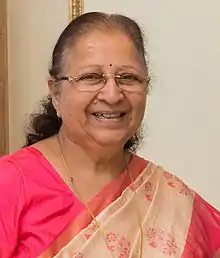
| Sumitra Mahajan (1943-) | Indore | 6 June 2014 | 17 June 2019 | 5 years, 11 days | 16th | Bharatiya Janata Party | |
| 17 | _(cropped).jpg.webp)
| Om Birla (1962-) | Kota | 19 June 2019 | Incumbent | 4 years, 129 days | 17th | ||
- A number in parentheses indicates that the incumbent has previously held office.
See also
- Vice President of India (Chairperson of the Rajya Sabha)
- Deputy Speaker of the Lok Sabha
- Deputy Chairperson of the Rajya Sabha
- Leader of the House in Lok Sabha
- Leader of the Opposition in Lok Sabha
- Leader of the House in Rajya Sabha
- Leader of the Opposition in Rajya Sabha
- Secretary General of the Lok Sabha
References
- "Members : Lok Sabha". 164.100.47.194. Retrieved 10 April 2021.
- "The Office of Speaker Lok Sabha". speakerloksabha.nic.in. Retrieved 28 March 2018.
- "Election of Speaker and Deputy Speaker and Nomination of Panel of Chairpersons" (PDF). 164.100.47.194. Retrieved 21 December 2018.
- "The Office of Speaker Lok Sabha". speakerloksabha.nic.in. Retrieved 21 December 2018.
- "Sections 7 & 8k, Representation of the People Act, 1951" (PDF). Archived from the original (PDF) on 1 May 2015. Retrieved 2 July 2015.
- "Aadhaar Act as Money Bill: Why the Lok Sabha isn't Immune from Judicial Review". Retrieved 29 July 2016.
- "Interpretation of Article 122 by the Supreme Court". Retrieved 3 August 2017.
- Ashok, Akash Deep (4 June 2014). "Pro tem Speaker: All you need to know about this parliamentary post". India Today. Retrieved 21 September 2014.
- "The Office of Speaker Lok Sabha". speakerloksabha.nic.in. Retrieved 14 October 2021.